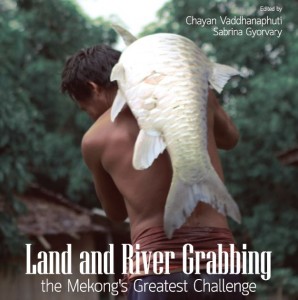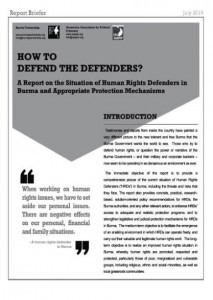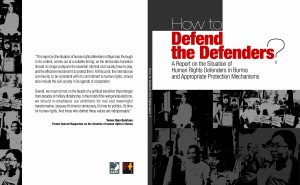Posts Tagged ‘ASEAN’ (637 found)
Land and River Grabbing: The Mekong’s Greatest Challenge
07-Land-and-River-Grabbing-2015 sm  Throughout the Mekong region, large-scale development projects such as hydropower dams, mines, conventional power plants, and mono-crop plantations are displacing communities and limiting access to natural resources. Several hydropower dams have already been built on the Upper Mekong in China’s Yunnan Province, and the governments of Cambodia, Laos and Thailand are planning eleven additional large dams on the Mekong River’s mainstream. If completed, these dams would not only destroy local ecosystems, but also reduce the fl ow of silt throughout the Mekong River system, and block major fi sh migrations, placing at risk over sixty million people who depend on the Mekong for their food security and income […]
Throughout the Mekong region, large-scale development projects such as hydropower dams, mines, conventional power plants, and mono-crop plantations are displacing communities and limiting access to natural resources. Several hydropower dams have already been built on the Upper Mekong in China’s Yunnan Province, and the governments of Cambodia, Laos and Thailand are planning eleven additional large dams on the Mekong River’s mainstream. If completed, these dams would not only destroy local ecosystems, but also reduce the fl ow of silt throughout the Mekong River system, and block major fi sh migrations, placing at risk over sixty million people who depend on the Mekong for their food security and income […]
Foreign Office Minister Hugo Swire Visits Burma’s Rakhine State
Mr Swire spent Sunday and Monday in Rakhine State, where he met residents of Muslim and Buddhist IDP camps, community leaders and the state government, to assess the current political and humanitarian situation. On Tuesday he met senior government ministers in Naypyidaw […]
• • •Report Briefer: How to Defend the Defenders? A Report on the Situation of Human Rights Defenders in Burma and Appropriate Protection Mechanisms
 Testimonies and reports from inside the country have painted a very different picture to the new tolerant and free Burma that the Burma Government wants the world to see. Those who try to defend human rights, or question the power or narrative of the Burma Government — and their military and corporate backers —now seem to be operating in as dangerous an environment as ever […]
Testimonies and reports from inside the country have painted a very different picture to the new tolerant and free Burma that the Burma Government wants the world to see. Those who try to defend human rights, or question the power or narrative of the Burma Government — and their military and corporate backers —now seem to be operating in as dangerous an environment as ever […]
How to Defend the Defenders? A Report on the Situation of Human Rights Defenders in Burma and Appropriate Protection Mechanisms
HRD Report  Testimonies and reports from inside the country have painted a very different picture to the new tolerant and free Burma that the Burma Government wants the world to see. Those who try to defend human rights, or question the power or narrative of the Burma Government — and their military and corporate backers —now seem to be operating in as dangerous an environment as ever […]
Testimonies and reports from inside the country have painted a very different picture to the new tolerant and free Burma that the Burma Government wants the world to see. Those who try to defend human rights, or question the power or narrative of the Burma Government — and their military and corporate backers —now seem to be operating in as dangerous an environment as ever […]
Activist Su Su Nway Arrested for Trespassing
RANGOON — Labor rights activist Su Su Nway was arrested on Thursday on charges of trespassing in relation to her support for farmers claiming their lands had been seized by the military […]
• • •Amid a Worsening Human Rights Situation, the Burma Government Must End the Persecution of Human Rights Defenders
[Chiang Mai – 24 July 2015] The Burma Government must immediately cease the targeting, oppressing, stifling, controlling and silencing of human rights defenders (HRDs) and strengthen judicial and legislative protection mechanisms to safeguard the work of HRDs so that they can carry out their valuable and legitimate human rights work, the Assistance Association for Political Prisoners and Burma Partnership said in a joint report released today […]
• • •Media Advisory: Launch of a Report on the Situation of Human Rights Defenders in Burma and Appropriate Protection Mechanisms
A new report, “How to Defend the Defenders? A Report on the Situation of Human Rights Defenders in Burma and Appropriate Protection Mechanisms,” co-authored by the Assistance Association for Political Prisoners and Burma Partnership will be launched on 24 July 2015 at the “International Conference on Burma/Myanmar Studies” to be held at the Chiang Mai University in Thailand […]
• • •Jailed for Calling Themselves Rohingya
Burma Campaign UK today urged the High Representative of the European External Action Service, Federica Mogherini, to take action to free Rohingya community leaders, Ba Thar, Kyaw Khin, Kyaw Myint and Hla Myint, and to pressure the military-backed government in Burma to reform the Prisoners of Conscience Affairs Committee […]
• • •Special Representative of the Secretary-General for Children and Armed Conflict, Leila Zerrougui, Concludes Her First Visit to Myanmar
The United Nations Special Representative of the Secretary-General (SRSG) for children and armed conflict, Leila Zerrougui, concluded a five-day visit to Myanmar today. Her first visit to the country, at the invitation of the Government, aimed to assess the impact of the conflict on children in accordance with United Nations Security Council resolution 1612, focusing in particular on the implementation of the Joint Action Plan (JAP) signed in 2012 by the Government and the Country Task Force on Monitoring and Reporting (CTFMR) to end and prevent the recruitment and use of children by the armed forces of Myanmar (Tatmadaw). The SRSG visited Nay Pyi Taw, Yangon, Mandalay and Myitkyina (Kachin state) […]
• • •International Coordinating Committee Sub-Committee on Accreditation (ICCSCA) Accreditation of the National Human Rights Commission of Myamar (MNHRC)
The Myanmar National Human Rights Commission (MNHRC) was established in 2011 by Presidential Decree and feted as a showpiece of the government’s reformist credentials. There was significant hype and promise surrounding the establishment of the MNHRC in 2011, as it signaled the possibility of genuine political reforms while the country embarked on nascent political and economic reforms […]
• • •








 All posts
All posts